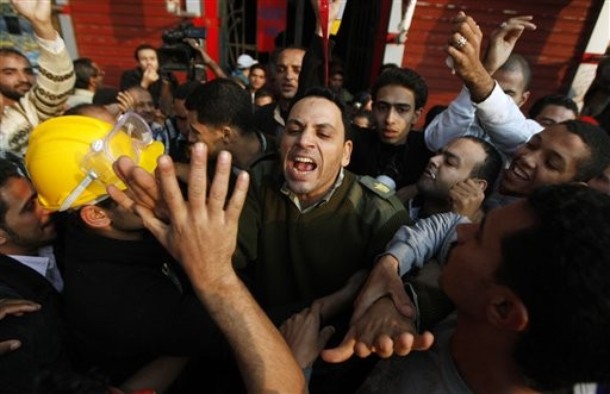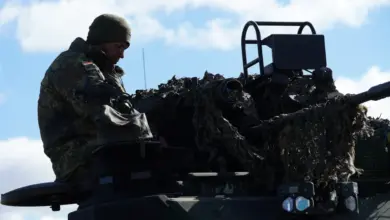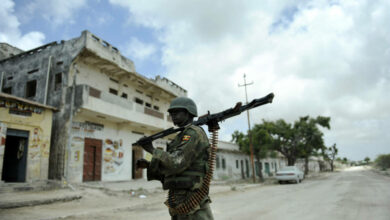
Just one year ago, Egypt's ruling generals were faced with the first public collective act of defiance from within the ranks of the military.
On 8 April last year, 22 officers serving in the army, most of them in uniform, joined protesters in Tahrir Square to announce their support for the continuing revolution. The officers were arrested in a brutal military raid on the square that resulted in at least one civilian death, and are now serving two to three years in prison.
This first breaking of ranks, though perhaps the largest, has not been the last.
Since then, a few more officers — who seem to have been unable to balance the revolutionary zeal that gripped the nation with the strict principles of obedience and political neutrality that govern their behavior in the army — have chosen to voice their political opinions, reflecting support for the revolution and criticism of their commanders, according to supporters of the officers and their lawyer, Mohamed al-Rayes.
The repetition of these acts throughout the year indicates growing resentment within the military, albeit among a limited number that doesn’t threaten to create a real internal division, according to experts.
The 8 April officers announced that they decided to go down to Tahrir Square to prove to the people that they are actually with them. They saw it as unconscionable that military leaders announced that they were with the revolution and acted otherwise.
One incident that officers recalled is when Supreme Council of the Armed Forces member Mokhtar al-Molla addressed officers in a meeting with one of the units and said, “These are some kids that went too far and we will stop them,” in reference to the revolutionaries.
“He forgot that these officers are the same as the youths of the country that he was talking about,” said retired military officer Tarek Wadi’, the father of one of the 8 April officers, Mohamed Wadi’.
“They wanted to warn the people, to tell them the military council is not on your side — if they wanted any harm, they would have gone down with their weapons,” he said.
However, the officers were criticized by many for seeking refuge amid an unarmed crowd of protesters last April.
Mohamed Wadi’ has already served time for a poem that he wrote in 2010 in which he harshly criticized the leadership of the military and the country, hinting at corruption on both levels and warning of an imminent rebellion.
In March 2011, Wadi’ was pardoned of his one-year-sentence following the revolution, only to be arrested again three weeks later for joining protesters in the square in civilian clothes.
The officers were initially sentenced to 10 years in prison, though the sentences were later reduced to two and three years.
Nesreen, one of the founders of the Supporters of the 8 April Officers Movement, said the public apathy toward the officers’ case is dangerous because it makes them easy prey for the military to pin more charges on them while they are in custody.
Wadi’, along with three other officers, was sentenced to an additional six months with charges of assaulting an officer, which the officers' families and lawyers deny. In addition, there are two ongoing cases currently involving six of the officers charged with disobedience of military rules, relating to a phone confiscated from one of the officers, statements on social and mainstream media attributed to them, and a sit-in that they held one day in the prison asking for a full pardon.
The families also complain about the difficult conditions their imprisoned relatives face. After he continued writing poems from his prison cell and leaked them out, Wadi’ was moved last month to solitary confinement in an Alexandria prison.
SCAF members Mohsen al-Fangary and Mahmoud Hegazy held a meeting with the officers’ families last Thursday during which the parents said animosity toward their sons was apparent.
“Our children are being punished, but those who stripped a girl of her clothes, the officer who conducted virginity tests and those who killed people with live ammunition are left free,” said the mother of Wadi’.
Crimes attributed to military officers have been publicized throughout the year. They include reports of virginity tests on female detainees, officers’ running over protesters with military vehicles during an October march, and a widely circulated picture that showed soldiers stripping a woman naked at a December protest.
The 8 April officers continue to leak statements to their supporters, who then post them on their Facebook pages. The statements include highly critical views of the military leaders and assert that all officers in the military are as disgruntled as they are.
In their last statement, released in January, the 8 April officers requested a meeting with Parliament’s national security and defense committee to reveal the corruption in the military and in its ruling council.
Even before protesters took took to the square last January, experts say there were small and subtle acts of rebellion within the armed forces that were largely outside the scope of public attention.
“There were trickles from a small minority that usually took a passive form, such as resignation or leaving the country,” says political analyst Abdel Moneim Saeed of Al-Ahram Center of Political and Strategic Studies.
For example, military intelligence officer Ayman Salem was arrested one month before the 25 January protests last year for calling for a rebellion against former President Hosni Mubarak’s regime on his personal website. He remains incarcerated and his whereabouts unknown.
And it seems other scattered acts of rebellion continue to emerge from within the barracks.
Three senior officers and one retired general were arrested in May after voicing pro-revolutionary opinions on the internet and being suspected of conspiring against the military, Rayes, the officers’ lawyer, said. One was released on good behavior after serving half of his one-year sentence, while three remain in prison.
On 20 November, as clashes intensified between military officers and protesters, three more officers joined the protesters in Tahrir Square.
Ahmed Shouman, who had already been sentenced and pardoned for addressing protesters in Tahrir Square shortly before Mubarak’s resignation, was sentenced to six years, another officer was sentenced to five years last week and a third is still on trial.
Meanwhile, Saeed says that as a minority of officers react to the current revolutionary phase by choosing loyalty to the people over loyalty to the military, for the majority, their reaction is the opposite.
Saeed said that seeing the sacred ethics of the military revolving around obedience and conformity jeopardized, most officers have become more protective of these values to the extent that they develop animosity toward the people, who they perceive to be a threat to the military institution.
This, Saeed said, explains acts of extreme savageness committed by the military forces against protesters.
Those who rebel among the military ranks are generally unable to cope with witnessing violations against people, Saeed believes.
“But in Egypt, the side of the loyalty to the military institution always wins,” he said.




